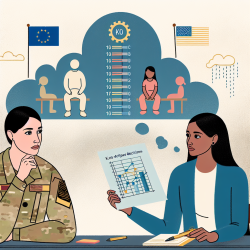Introduction
As schools prepare to reopen amidst the ongoing COVID-19 pandemic, practitioners need to be equipped with the latest research and strategies to support children with asthma. The research article titled "COVID-19, asthma, and return to school" provides valuable insights into managing asthma in the school setting during these challenging times. This blog aims to help practitioners improve their skills by implementing the outcomes of this research or encouraging further exploration into the topic.
Understanding the Challenges
Returning to school presents unique challenges for children with asthma. The annual autumn spike in asthma attacks, known as the "September epidemic," is exacerbated by factors such as colder weather, viral infections, and reduced medication compliance. The ongoing pandemic adds another layer of complexity, with constraints on healthcare resources and the potential for confusion between asthma and COVID-19 symptoms.
Key Recommendations for Practitioners
- Prioritize Rapid Testing: Ensure rapid testing services are available for children displaying respiratory symptoms to minimize educational disruptions.
- Focus on Asthma Control: Implement evidence-based approaches to asthma management, emphasizing medication adherence and personalized asthma action plans.
- Improve Environmental Conditions: Advocate for improved indoor air quality in schools, including better ventilation and the use of non-irritating cleaning products.
- Promote Influenza Vaccination: Encourage families to vaccinate children with asthma against influenza to reduce respiratory risks.
Implementing Evidence-Based Strategies
Practitioners should adhere to the Global Initiative for Asthma (GINA) guidelines, which recommend a cycle of assessment, adjustment, and review. This approach ensures that asthma management is responsive to changes in the school environment and individual needs. Practitioners can also play a crucial role in educating families about the importance of asthma control and the benefits of vaccination.
Addressing Social Determinants of Health
Social determinants such as housing quality, access to healthcare, and economic conditions significantly impact asthma management. Practitioners should be aware of these factors and work collaboratively with schools and families to address them. This holistic approach will help ensure that children with asthma can return to school safely and thrive academically and socially.
Encouraging Further Research
While the current research provides a solid foundation, there is a need for ongoing studies to better understand the long-term impacts of COVID-19 on children with asthma. Practitioners are encouraged to stay informed through conferences, publications, and webinars, and to contribute to the growing body of knowledge in this field.
Conclusion
Ensuring the safe return of children with asthma to school requires a multifaceted approach that includes rapid testing, effective asthma management, and addressing social determinants of health. By implementing the recommendations from the research article "COVID-19, asthma, and return to school," practitioners can play a pivotal role in supporting these students. To read the original research paper, please follow this link: COVID-19, asthma, and return to school.










